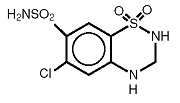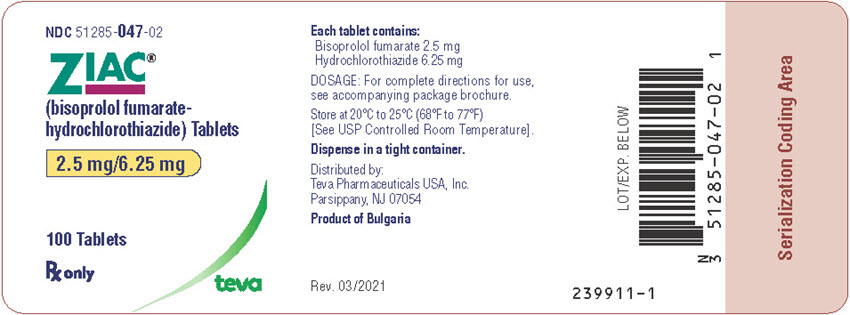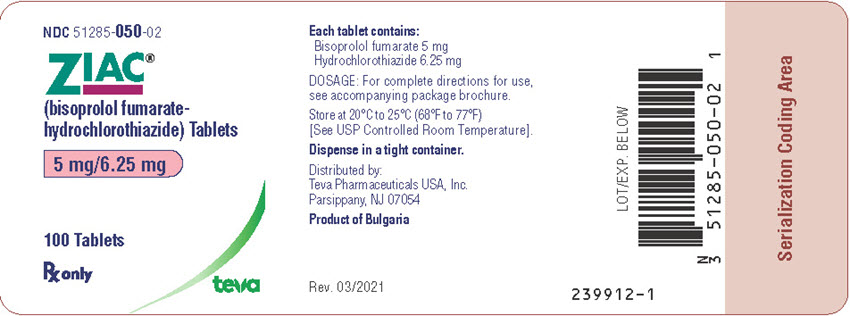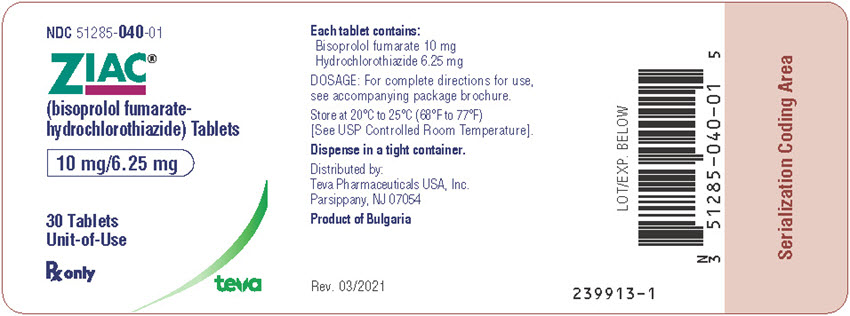Ziac
Generic name: hydrochlorothiazide and bisoprolol
Drug class: Beta blockers with thiazides
Medically reviewed by A Ras MD.
What is Ziac used for?
Ziac is a prescription medicine that is used to treat high blood pressure.
Description
ZIAC® (bisoprolol fumarate and hydrochlorothiazide) is indicated for the treatment of hypertension. It combines two antihypertensive agents in a once-daily dosage: a synthetic beta1-selective (cardioselective) adrenoceptor blocking agent (bisoprolol fumarate) and a benzothiadiazine diuretic (hydrochlorothiazide).
Bisoprolol fumarate is chemically described as (±)-1-[4-[[2-(1-methylethoxy)ethoxy]methyl]phenoxy]-3-[(1-methylethyl)amino]-2-propanol(E)-2-butenedioate (2:1) (salt). It possesses an asymmetric carbon atom in its structure and is provided as a racemic mixture. The S(-) enantiomer is responsible for most of the beta-blocking activity. Its empirical formula is (C18H31NO4)2•C4H4O4 and it has a molecular weight of 766.97. Its structural formula is:

Bisoprolol fumarate is a white crystalline powder, approximately equally hydrophilic and lipophilic, and readily soluble in water, methanol, ethanol, and chloroform.
Hydrochlorothiazide (HCTZ) is 6-Chloro-3,4-dihydro-2H-1,2,4-benzothiadiazine-7-sulfonamide 1,1-dioxide. It is a white, or practically white, practically odorless crystalline powder. It is slightly soluble in water, sparingly soluble in dilute sodium hydroxide solution, freely soluble in n-butylamine and dimethylformamide, sparingly soluble in methanol, and insoluble in ether, chloroform, and dilute mineral acids. Its empirical formula is C7H8ClN3O4S2 and it has a molecular weight of 297.73. Its structural formula is:

Each ZIAC®-2.5 mg/6.25 mg tablet for oral administration contains:
Bisoprolol fumarate…………………………………………..2.5 mg
Hydrochlorothiazide………………………………………..6.25 mg
Each ZIAC®-5 mg/6.25 mg tablet for oral administration contains:
Bisoprolol fumarate……………………………………………5 mg
Hydrochlorothiazide………………………………………..6.25 mg
Each ZIAC®-10 mg/6.25 mg tablet for oral administration contains:
Bisoprolol fumarate……………………………………………10 mg
Hydrochlorothiazide………………………………………..6.25 mg
Inactive ingredients include Corn Starch, Dibasic Calcium Phosphate, Hypromellose, Magnesium Stearate, Microcrystalline Cellulose, Polyethylene Glycol, Polysorbate 80, and Titanium Dioxide. The 10 mg/6.25mg tablet also contains Colloidal Silicon Dioxide. The 5 mg/6.25 mg tablet also contains Colloidal Silicon Dioxide, and Red and Yellow Iron Oxide. The 2.5 mg/6.25 mg tablet also contains Crospovidone, Pregelatinized Starch, and Yellow Iron Oxide.
Before taking Ziac, tell your doctor:
- If you are allergic to Ziac; any part of this medicine; or any other drugs, foods, or substances. Tell your doctor about the allergy and what signs you had.
- If you have any of these health problems: Heart block, shock caused by heart problems, or slow heartbeat.
- If you have any of these health problems: Asthma or other breathing problems like COPD (chronic obstructive pulmonary disease).
- If you have heart failure (weak heart).
- If you have kidney disease.
- If you are not able to pass urine.
- If you are taking lithium.
- If you are taking dofetilide.
- If you are using another drug like this one. If you are not sure, ask your doctor or pharmacist.
- If you are breast-feeding or plan to breast-feed.
This is not a list of all drugs or health problems that interact with this medicine.
Tell your doctor and pharmacist about all of your drugs (prescription or OTC, natural products, vitamins) and health problems. You must check to make sure that it is safe for you to take Ziac with all of your drugs and health problems. Do not start, stop, or change the dose of any drug without checking with your doctor.
What are some things I need to know or do while I take Ziac?
- Tell all of your health care providers that you take Ziac. This includes your doctors, nurses, pharmacists, and dentists.
- Avoid driving and doing other tasks or actions that call for you to be alert until you see how Ziac affects you.
- To lower the chance of feeling dizzy or passing out, rise slowly if you have been sitting or lying down. Be careful going up and down stairs.
- Check blood pressure and heart rate as the doctor has told you.
- Have blood work checked as you have been told by the doctor. Talk with the doctor.
- This medicine may affect certain lab tests. Tell all of your health care providers and lab workers that you take Ziac.
- Talk with your doctor before you drink alcohol or use other drugs and natural products that slow your actions.
- This medicine may hide the signs of low blood sugar. Talk with the doctor.
- If you have high blood sugar (diabetes), you will need to watch your blood sugar closely.
- Do not stop taking Ziac all of a sudden. If you do, chest pain that is worse and in some cases heart attack may occur. The risk may be greater if you have certain types of heart disease. To avoid side effects, you will want to slowly stop Ziac as ordered by your doctor. Call your doctor right away if you have new or worse chest pain or if other heart problems occur.
- Watch for gout attacks.
- Be careful in hot weather or while being active. Drink lots of fluids to stop fluid loss.
- Talk with your doctor before using OTC products that may raise blood pressure. These include cough or cold drugs, diet pills, stimulants, ibuprofen or like products, and some natural products or aids.
- Tell your doctor if you have too much sweat, fluid loss, throwing up, or loose stools. This may lead to low blood pressure.
- This medicine may make you sunburn more easily. Use care if you will be in the sun. Tell your doctor if you sunburn easily while taking Ziac.
- This medicine may make it harder to tell if you have signs of an overactive thyroid like fast heartbeat. If you have an overactive thyroid and stop taking Ziac all of a sudden, it may get worse and could be life-threatening. Talk with your doctor.
- If you have had a very bad allergic reaction, talk with your doctor. You may have a chance of an even worse reaction if you come into contact with what caused your allergy. If you use epinephrine to treat very bad allergic reactions, talk with your doctor. Epinephrine may not work as well while you are taking Ziac.
- Tell your doctor if you are pregnant or plan on getting pregnant. You will need to talk about the benefits and risks of using Ziac while you are pregnant.
How is Ziac best taken?
Use Ziac as ordered by your doctor. Read all information given to you. Follow all instructions closely.
- Keep taking Ziac as you have been told by your doctor or other health care provider, even if you feel well.
- This medicine may cause you to pass urine more often. To keep from having sleep problems, try not to take too close to bedtime.
- Take Ziac at the same time of day.
- If you take cholestyramine or colestipol, talk with your pharmacist about how to take them with Ziac.
- If you are on a low-salt or salt-free diet, talk with your doctor.
What do I do if I miss a dose?
- Take a missed dose as soon as you think about it.
- If it is close to the time for your next dose, skip the missed dose and go back to your normal time.
- Do not take 2 doses at the same time or extra doses.
What are the side effects of Ziac that I need to call my doctor about immediately?
WARNING/CAUTION: Even though it may be rare, some people may have very bad and sometimes deadly side effects when taking a drug. Tell your doctor or get medical help right away if you have any of the following signs or symptoms that may be related to a very bad side effect:
- Signs of an allergic reaction, like rash; hives; itching; red, swollen, blistered, or peeling skin with or without fever; wheezing; tightness in the chest or throat; trouble breathing, swallowing, or talking; unusual hoarseness; or swelling of the mouth, face, lips, tongue, or throat.
- Signs of fluid and electrolyte problems like mood changes, confusion, muscle pain or weakness, a heartbeat that does not feel normal, very bad dizziness or passing out, fast heartbeat, more thirst, seizures, feeling very tired or weak, not hungry, unable to pass urine or change in the amount of urine produced, dry mouth, dry eyes, or very bad upset stomach or throwing up.
- Signs of a pancreas problem (pancreatitis) like very bad stomach pain, very bad back pain, or very bad upset stomach or throwing up.
- Signs of kidney problems like unable to pass urine, change in how much urine is passed, blood in the urine, or a big weight gain.
- Chest pain.
- Slow heartbeat.
- Shortness of breath, a big weight gain, or swelling in the arms or legs.
- Dark urine or yellow skin or eyes.
- A burning, numbness, or tingling feeling that is not normal.
- Any skin change.
- This medicine can cause certain eye problems. If left untreated, this can lead to lasting eyesight loss. If eye problems happen, signs like change in eyesight or eye pain most often happen within hours to weeks of starting Ziac. Call your doctor right away if you have these signs.
- If you have lupus, Ziac can make your lupus active or get worse. Tell your doctor right away if you get any new or worse signs.
What are some other side effects of Ziac?
All drugs may cause side effects. However, many people have no side effects or only have minor side effects. Call your doctor or get medical help if any of these side effects or any other side effects bother you or do not go away:
- Dizziness.
- Headache.
- Feeling tired or weak.
These are not all of the side effects that may occur. If you have questions about side effects, call your doctor. Call your doctor for medical advice about side effects.
You may report side effects to the FDA at 1-800-332-1088. You may also report side effects at https://www.fda.gov/medwatch.
If overdose is suspected:
If you think there has been an overdose, call your poison control center or get medical care right away. Be ready to tell or show what was taken, how much, and when it happened.
How do I store and/or throw out Ziac?
- Store at room temperature.
- Store in a dry place. Do not store in a bathroom.
- Keep all drugs in a safe place. Keep all drugs out of the reach of children and pets.
- Throw away unused or expired drugs. Do not flush down a toilet or pour down a drain unless you are told to do so. Check with your pharmacist if you have questions about the best way to throw out drugs. There may be drug take-back programs in your area.
Label’
PACKAGE/LABEL DISPLAY PANEL
- NDC 51285-047-02
- ZIAC® (bisoprolol fumarate-hydrochlorothiazide) Tablets
- 2.5 mg/6.25 mg 100 Tablets
- TEVA
- Rx only

PACKAGE/LABEL DISPLAY PANEL
- NDC 51285-050-02
- ZIAC® (bisoprolol fumarate-hydrochlorothiazide) Tablets
- 5 mg/6.25 mg 100 Tablets
- TEVA
- Rx only

PACKAGE/LABEL DISPLAY PANEL
- NDC 51285-040-01
- ZIAC® (bisoprolol fumarate-hydrochlorothiazide) Tablets
- 10 mg/6.25 mg 30 Tablets Unit-of-Use
- TEVA
- Rx only

SRC: NLM .
